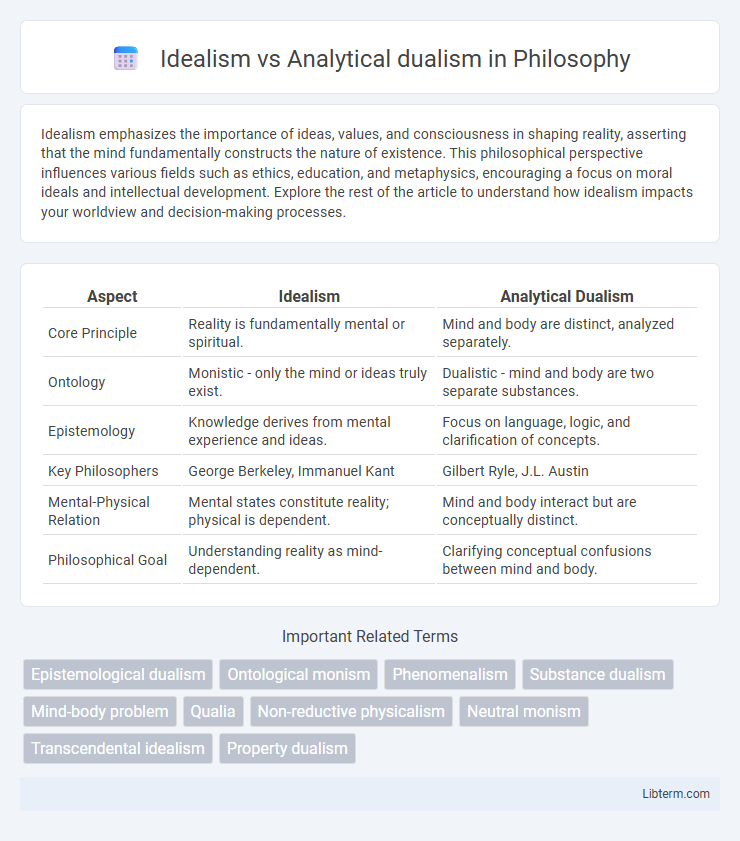Idealism emphasizes the importance of ideas, values, and consciousness in shaping reality, asserting that the mind fundamentally constructs the nature of existence. This philosophical perspective influences various fields such as ethics, education, and metaphysics, encouraging a focus on moral ideals and intellectual development. Explore the rest of the article to understand how idealism impacts your worldview and decision-making processes.
Table of Comparison
| Aspect | Idealism | Analytical Dualism |
|---|---|---|
| Core Principle | Reality is fundamentally mental or spiritual. | Mind and body are distinct, analyzed separately. |
| Ontology | Monistic - only the mind or ideas truly exist. | Dualistic - mind and body are two separate substances. |
| Epistemology | Knowledge derives from mental experience and ideas. | Focus on language, logic, and clarification of concepts. |
| Key Philosophers | George Berkeley, Immanuel Kant | Gilbert Ryle, J.L. Austin |
| Mental-Physical Relation | Mental states constitute reality; physical is dependent. | Mind and body interact but are conceptually distinct. |
| Philosophical Goal | Understanding reality as mind-dependent. | Clarifying conceptual confusions between mind and body. |
Introduction to Idealism vs Analytical Dualism
Idealism posits that reality is fundamentally mental or immaterial, emphasizing consciousness as the primary substance, whereas Analytical Dualism distinguishes mind and body as two distinct entities, focusing on their interaction and separability. Idealism traces philosophical roots to thinkers like Berkeley, who argued that material objects exist only as perceptions within minds. Analytical Dualism, influenced by philosophers such as Descartes, systematically analyzes the mind-body problem, highlighting the ontological differences and challenges in explaining mental causation within physical frameworks.
Historical Background of Idealism
Idealism originated in ancient philosophy, notably with Plato's theory of forms, which posited that reality is fundamentally mental or immaterial. In the 18th and 19th centuries, philosophers like Immanuel Kant and George Berkeley advanced idealism by arguing that the mind shapes experience and that material objects depend on perception. This historical background contrasts sharply with Analytical dualism, which emerged from 20th-century analytic philosophy emphasizing the distinct existence of both mind and body as separate substances.
Origins and Development of Analytical Dualism
Analytical dualism, rooted in the philosophy of Rene Descartes and further refined by Gilbert Ryle, critically distinguishes the mind and body as separate substances, countering idealism's assertion that reality is fundamentally mental. The development of analytical dualism emerged through rigorous linguistic analysis and conceptual clarification of mental states versus physical processes, emphasizing behavioral and functional criteria as key to understanding mental phenomena. This approach challenges idealism by maintaining a clear ontological division, fostering ongoing debates in philosophy of mind and cognitive science about consciousness and personal identity.
Key Philosophical Concepts: Idealism
Idealism posits that reality is fundamentally mental or spiritual, asserting that consciousness shapes the nature of existence rather than material objects existing independently. Central concepts include the notion that ideas, perceptions, or the mind constitute the primary substance of the universe, with figures like George Berkeley advocating for immaterialism, which denies the independent existence of matter outside perception. This contrasts with Analytical Dualism, which separates mind and body as distinct substances, while Idealism emphasizes that all entities are ultimately manifestations of a unified mental or ideal reality.
Core Principles of Analytical Dualism
Analytical dualism centers on the clear distinction between the mind and body as fundamentally separate substances, with the mind possessing non-physical properties that cannot be reduced to physical brain states. It emphasizes the mind's autonomous, first-person subjective experiences, which maintain causal interactions with the physical body without being identical to it. This core principle contrasts with idealism by rejecting the idea that mental phenomena are simply manifestations of an all-encompassing mind or consciousness.
Mind, Matter, and Reality: Contrasting Perspectives
Idealism asserts that reality is fundamentally mental, with the mind shaping the nature of matter and physical existence. Analytical dualism, in contrast, posits that mind and matter are distinct substances, emphasizing a clear ontological separation between mental states and physical objects. These contrasting perspectives shape debates on the nature of consciousness, the interaction between mind and body, and the foundational structure of reality.
Arguments Supporting Idealism
Idealism asserts that reality is fundamentally mental, emphasizing consciousness as the primary substance over physical matter. Proponents argue that the consistency and coherence of experiences are best explained by an underlying mental framework, challenging the independent existence of the physical world. This perspective is supported by phenomena such as perceptual illusions and subjective experiences, which suggest that reality is shaped by the mind rather than existing solely in material form.
Critiques and Limitations of Analytical Dualism
Analytical dualism, which separates the mental and physical realms, faces criticism for its reliance on an ontological divide that lacks empirical support and struggles to explain the interaction between mind and body effectively. Critics argue that it oversimplifies complex mental processes by bifurcating consciousness and physical brain states, limiting its explanatory power in neuroscience and cognitive science. This dualistic framework often leads to explanatory gaps, hindering integration with scientific findings and prompting calls for more unified theories of mind.
Real-World Implications and Applications
Idealism emphasizes the primacy of mind and ideas, influencing fields like education and political theory by advocating that reality is mentally constructed. Analytical dualism, which separates mind and body as distinct substances, underpins modern cognitive science and philosophy of mind, guiding research on consciousness and neurobiology. These perspectives shape practical approaches in mental health treatment, artificial intelligence development, and ethical decision-making frameworks.
Conclusion: Finding Common Ground or Divergence
Idealism and analytical dualism diverge fundamentally on the nature of reality, with idealism asserting that consciousness forms the basis of existence, while analytical dualism maintains a strict separation between mind and body as distinct substances. Despite these differences, both perspectives contribute to the broader philosophical discourse on the mind-body problem by highlighting the complexities of mental and physical interactions. Finding common ground may involve recognizing the limitations of purely material or immaterial explanations and exploring integrative approaches such as neutral monism or property dualism.
Idealism Infographic

 libterm.com
libterm.com